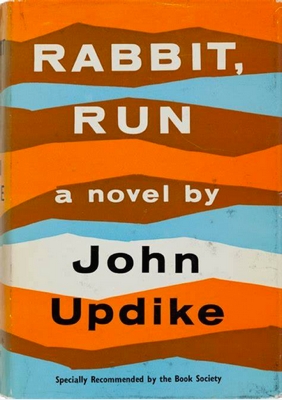Writing for a new Oxford University newspaper, The Oxford Blue, Nicholas Champness identified “Books That Made Me: Rabbit.” He of course was referring to Updike’s Rabbit,Run, Rabbit Redux, Rabbit Is Rich, and Rabbit at Rest, collected together in the Everyman’s Library as Rabbit Angstrom.
“The novels deal with a period of great change in American society. We see American change from the Eisenhower era, through the ‘Summer of Love,’ then Watergate, the Vietnam War, Reaganomics, and the Cold War. However, the focus of the novels is not on the great sweeping canvas of history and certainly not an influential figure. Rather, Updike presents us with history and politics as they affect a real person, someone totally ordinary with little claim to fame other than the provincial sporting prowess of his youth. The canvas of current affairs becomes the conversations had in the car en route to the ball game, opinions discussed curtly over the dinner table. Simply put, Updike shows how the ‘ordinary Joe’ reacts to these events,” Champness wrote.
“He draws his characters, rather than simply describing them. He makes them authentic and believable, imbued with nuance. Well-drawn female characters in the series can prove to be somewhat sparse, for which Updike has faced criticism. Yet, I wonder whether this is an issue,” Champness wrote.
“Rabbit’s mundanity and Updike’s decision that such mundanity is a worthy subject of literature invites the reader to reconsider. What is the point of literature and what is a worthy subject of it? What makes something beautiful or otherwise? Perhaps, then, we can understand Updike’s role as one of a mediator. He invites his reader to see the beauty in the ordinary,” Champness wrote.
“Updike’s treatment of life is one of the main reasons why I chose this series. Updike shows us that life and humans are much the same; they are both flawed and mundane, yet this is where we find beauty in them. I often find myself coming back to the ideas expressed here,” Champness wrote.

